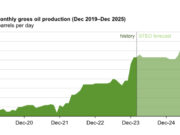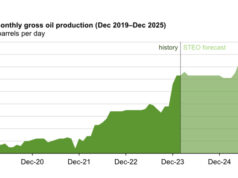ExxonMobil Guyana’s President, Alistair Routledge on Tuesday addressed concerns surrounding delays in the gas-to-energy project. He acknowledged, to some extent, the company’s role in the setback. His statement comes amidst arbitration proceedings initiated by a United States (US) company, CH4-Lindsayca, a key contractor for the project, for substantial cost overruns amounting to US$90 million.
The backdrop for this development stems from Vice President, Bharrat Jagdeo’s disclosure during a weekly press briefing earlier this month, wherein he attributed the arbitration filing to project delays, squarely placing responsibility on ExxonMobil and its local contractor, Guyana Shore Base Inc. Jagdeo had highlighted ExxonMobil’s contractual obligations, emphasizing its responsibility for crucial site preparation tasks, including road upgrades, construction of material offloading facilities, and land preparation, which were not completed on schedule.
During a press briefing held earlier today, Routledge addressed these allegations by noting the agreement between ExxonMobil and the Stabroek block consortium, comprising Exxon, Hess Corporation and CNOOC Petroleum, to undertake early enabling works necessary for the project. These works included clearing the site at Wales, stabilizing the ground for construction, and improving access roads—an initiative aimed at expediting project timelines.
According to Routledge, “It was agreed that ExxonMobil on behalf of Stabroek would execute what we call those early enabling work.” He elaborated, “Clearing the 100 acres of the site at Wales where the plant will be constructed, clearing the ground beginning to bring in the sand in order to stabilize the ground for construction and all that and heavy haul road for the offloading facility and improving the access roads on banks.”
While acknowledging minor delays in the delivery of equipment such as sand barges, Routledge stressed that these did not significantly impact project progress, particularly during the early engineering and design stages.
He stated, “There were some delays and sand barges and other equipment. But those were pretty minimal. And the reality is our view and the government’s views (is) that (it) didn’t actually impact the progress of (the works or)let’s say for CH4.”
Responding to questions regarding the government blaming ExxonMobil for the delays, Routledge clarified, “It is accurate to say that it wasn’t the same delivery date that was anticipated for the handover, but that there’s no material impact.”
He emphasized the shared commitment among stakeholders to ensure the timely completion of the project, underscoring its significance in reducing energy costs and benefitting the country’s populace.













